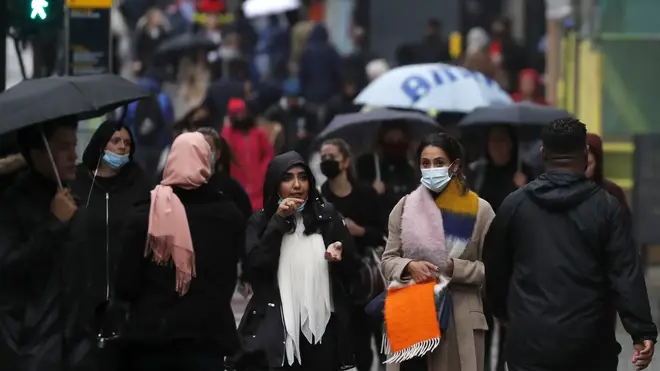
Ian Payne 4am - 7am
13 October 2020, 15:01

Coronavirus deaths are at the highest levels since July after rising for a fourth week in a row, new figures show.
There have now been more than 58,500 deaths where Covid-19 was mentioned on the death certificate since the start of the pandemic, according to the Office for National Statistics.
A total of 321 virus deaths were registered in the week ending October 2, up from 215 deaths the week before.
Read more: PM goes against experts to reject 'circuit breaker' coronavirus lockdown
Read more: Sadiq Khan calls for two week 'circuit breaker' national lockdown
It is the highest number of registered deaths involving Covid-19 since the week ending July 10, and numbers in the North West are now at a level not seen since June.
The figures are also 390 higher than the five-year average for the same period year on year.

Sadiq Khan calls for two-week 'circuit breaker' national lockdown
Figures published on Tuesday by the ONS show that 53,335 deaths involving Covid-19 had occurred in England and Wales up to October 2.
In addition, 4,276 deaths involving Covid-19 had been registered in Scotland up to October 4, while 906 deaths had occurred in Northern Ireland up to October 2.
Read more: New advice to be issued for 2.2 million people who shielded during lockdown
Read more: Boris Johnson denies lockdown was eased too early in north of England
North west England had 106 weekly deaths – the highest number for the region since the week ending June 26.
In north east England, 40 deaths were registered in the same period, the highest for the region since the week to June 12.
Registered deaths involving Covid-19 increased week-on-week in all but the West Midlands and the south west.
In Wales the weekly total increased from 12 to 25.

Government ‘ignored scientists’ advice’ on lockdown last month
It comes as the Prime Minister rejected suggestions from his top scientists to have a "circuit breaker" national lockdown, despite them saying it would prevent the need for "intensive and long-term" restrictions later.
Last month, the Scientific Advisory Group for Emergencies (Sage) suggested immediately introducing a national lockdown lasting between two and three weeks to halt the rapid spread of the virus - dubbed a "circuit break" lockdown.
But as Boris Johnson laid out his plans for how to tackle the rapidly growing numbers of coronavirus cases whilst keeping as much of the economy open as possible, the PM only imposed stricter measures on Merseyside and appeared adamant to continue localised lockdowns.
He appeared to reject the idea of sweeping national measures when he laid out the new tiered system of restrictions on Monday, which includes the widespread closure of the hospitality sector and banning social interactions between households at its toughest level.
Many scientists, however, have expressed doubt over whether these measures will stop the rapid spread of coronavirus in the community.
Andrew Hayward, professor of infectious disease epidemiology at University College London and a member of Sage, said he did not think the restrictions included in tier 3 would result in the R rate being pushed below one, meaning the virus was likely to still spread at pace.
He said that the failure to "take decisive action several weeks ago" meant it was "not really surprising that we're continuing to see large increases in cases".
He added: "I think it is clear even at the so-called 'very high' levels of restrictions that they will not be sufficient to reduce R below one."